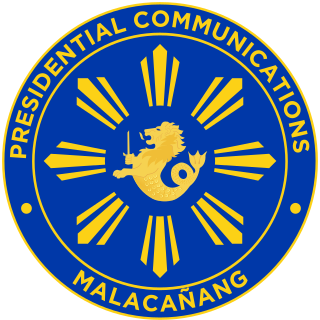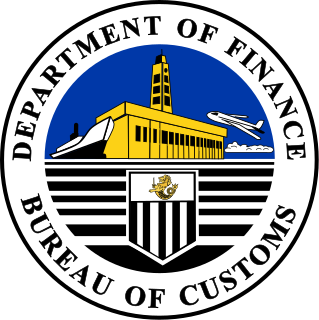External links
- http://www.port.bg/ - Executive Agency "Port Administration", Изпълнителна агенция "Пристанищна администрация"
The Executive Agency Port Administration is a corporate body of the Bulgarian Ministry of Transport. It consolidates regional divisions in Varna, Bourgas, Rousse, and Lom. Its legal authority covers all ports, excluding the navy ones.

The Cabinet of the United States is a body consisting of the vice president of the United States and the heads of the executive branch's federal executive departments in the federal government of the United States, which is regarded as the principal advisory body to the president of the United States. The president is not formally a member of the Cabinet. The heads of departments, appointed by the president and confirmed by the Senate, are members of the Cabinet, and acting department heads also sit at the Cabinet meetings whether or not they have been officially nominated for Senate confirmation. The president may designate heads of other agencies and non-Senate-confirmed members of the Executive Office of the President as Cabinet-level members of the Cabinet.

The Office of Management and Budget (OMB) is the largest office within the Executive Office of the President of the United States (EOP). OMB's most prominent function is to produce the president's budget, but it also examines agency programs, policies, and procedures to see whether they comply with the president's policies and coordinates inter-agency policy initiatives.

The Federal Emergency Management Agency (FEMA) is an agency of the United States Department of Homeland Security, initially created under President Jimmy Carter by Presidential Reorganization Plan No. 3 of 1978 and implemented by two Executive Orders on April 1, 1979. The agency's primary purpose is to coordinate the response to a disaster that has occurred in the United States and that overwhelms the resources of local and state authorities. The governor of the state in which the disaster occurs must declare a state of emergency and formally request from the President that FEMA and the federal government respond to the disaster. The only exception to the state's gubernatorial declaration requirement occurs when an emergency or disaster takes place on federal property or to a federal asset—for example, the 1995 bombing of the Alfred P. Murrah Federal Building in Oklahoma City, Oklahoma, or the Space Shuttle Columbia in the 2003 return-flight disaster.
Independent agencies of the United States federal government are agencies that exist outside the federal executive departments and the Executive Office of the President. In a narrower sense, the term refers only to those independent agencies that, while considered part of the executive branch, have regulatory or rulemaking authority and are insulated from presidential control, usually because the president's power to dismiss the agency head or a member is limited.
The United States federal executive departments are the principal units of the executive branch of the federal government of the United States. They are analogous to ministries common in parliamentary or semi-presidential systems but they are led by a head of government who is also the head of state. The executive departments are the administrative arms of the President of the United States. There are currently 15 executive departments.
A government or state agency, sometimes an appointed commission, is a permanent or semi-permanent organization in the machinery of government that is responsible for the oversight and administration of specific functions, such as an administration. There is a notable variety of agency types. Although usage differs, a government agency is normally distinct both from a department or ministry, and other types of public body established by government. The functions of an agency are normally executive in character since different types of organizations are most often constituted in an advisory role—this distinction is often blurred in practice however, it is not allowed.
The following list outlines the structure of the Government of Canada.

The War Shipping Administration (WSA) was a World War II emergency war agency of the US government, tasked to purchase and operate the civilian shipping tonnage the US needed for fighting the war. Both shipbuilding under the Maritime Commission and ship allocation under the WSA to Army, Navy or civilian needs were closely coordinated though Vice Admiral Emory S. Land who continued as head of the Maritime Commission while also heading the WSA.

The Mexican Secretariat for Home Affairs is the public department concerned with the country's domestic affairs, the presenting of the president's bills to Congress, their publication on the Official Journal of the Federation, and certain issues of national security. The country's principal intelligence agency, CISEN, is directly answerable to the Secretary of the Interior. The Secretary is a member of the President's Cabinet and is, given the constitutional implications of the post, the most important Cabinet Member. Additionally, in case of absolute absence of the President, the Secretary of Interior assumes the executive powers of the President provisionally. The Office is practically equivalent to Ministries of the Interior in most other countries and is occasionally translated to English as Ministry, Secretariat or Department of the Interior.

The Corporation of the City of Toronto, or simply the City of Toronto, is the organization responsible for the administration of the municipal government of Toronto, Ontario, Canada. Its powers and structure are set out in the City of Toronto Act.

The Department of Transportation is the executive department of the Philippine government responsible for the maintenance and expansion of viable, efficient, and dependable transportation systems as effective instruments for national recovery and economic progress. It is responsible for the country's land, air, and sea communications infrastructure.

The Presidential Communications Group, or simply the Communications Group, is the collective name for the offices within the Office of the President of the Philippines and refers to the following positions and offices: the Presidential Spokesperson and the Presidential Communications Operations Office (PCOO)—formerly known the Office of the Press Secretary.

Philippine Ports Authority is a government-owned and controlled corporation under the Department of Transportation as an attached agency. It is responsible for financing, management and operations of public ports throughout the Philippines, except the port of Cebu, which is under the Cebu Ports Authority.
The term administration, as used in the context of government, differs according to jurisdiction.

The Port of Pittsburgh is a vast river traffic region in southwestern Pennsylvania. It spans a twelve-county area including Allegheny, Armstrong, Beaver, Blair, Butler, Clarion, Fayette, Greene, Indiana, Lawrence, Washington, and Westmoreland Counties. It encompasses essentially all 200 miles of commercially navigable waterways in southwestern Pennsylvania, including the three major rivers in this region: the Allegheny, the Monongahela, and the Ohio. These waterways are made navigable by a system of seventeen locks and dams. The Port of Pittsburgh supports over 200 river terminals and barge industry service suppliers, including privately owned public river terminals. The port complex is served by the CSX and Norfolk Southern railroads and by four interstate highways. The Port of Pittsburgh Commission acts as a comprehensive service for shippers and industries seeking information on the river system.

The Ghana Revenue Authority (GRA) is the Ghana administration charged with the task of assessing, collecting and accounting for tax revenue in Ghana. The core mandate of the Authority is to ensure maximum compliance with relevant laws in order to ensure a sustainable revenue stream for government as well as the controlled and safe flow of goods across the county’s borders.

The executive branch of the government of Puerto Rico is responsible for executing the laws of Puerto Rico, as well as causing them to be executed. Article IV of the Constitution of Puerto Rico vests the executive power on the Governor—whom by its nature forms the executive branch.

The Bureau of Customs is a Philippine government agency under the Department of Finance. The Bureau of Customs was established on February 6, 1902 by the Insular Government of the Philippine Islands of the United States of America, during the American Colonial Era of the Philippines.

The Federal Agency for Maritime and River Transport (Rosmorrechflot), native name: Федеральное агентство морского и речного транспорта is a federal executive body in Russian Federation. It is entrusted to manage state property, maintain transport security-related tasks and provide services in the field of maritime and inland waterway transport. It is under the jurisdiction of the Ministry of Transport of the Russian Federation.